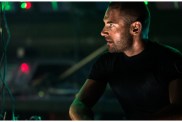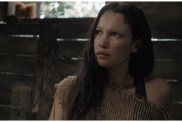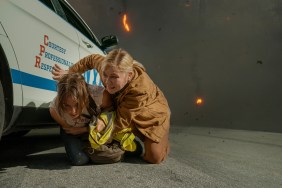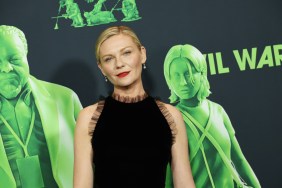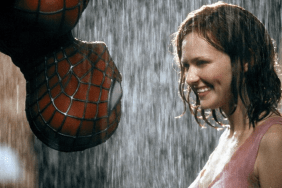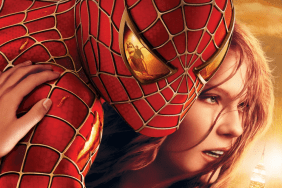Cast:
Kirsten Dunst as Justine
Charlotte Gainsbourg as Claire
Alexander Skarsgård as Michael
Kiefer Sutherland as John
Brady Corbet as Tim
Charlotte Rampling as Gaby
Jesper Christensen as Little Father
John Hurt as Dexter
Stellan Skarsgård as Jack
Udo Kier as Wedding Planner
Cameron Spurr as Leo
James Cagnard as Michael’s Father
Deborah Fronko as Michael’s Mother
Charlotta Miller as Betty 1
Gary Whitaker as Limo Driver
Katrine Sahlstrøm as Girl with Guitar
Christian Geisnæs as Wedding Photographer
Directed by Lars von Trier
Story:
It’s the wedding day of Justine and Michael (Kirsten Dunst, Alexander Skarsgard) and after arriving late for their reception, Justine suffers a bout of depression that just gets worse as the ceremonies progress. Meanwhile, her sister Claire (Charlotte Gainsbourg) has become obsessed with the revelation that there’s as planet called Melancholia that’s heading towards earth for a “fly-by” though the theories that it might collide with earth puts her into a panic.
Analysis:
It saddens me to say that Lars von Trier, once my favorite director for his quirky and eccentric sensibilities and his brilliant ability to develop characters, has finally lost me.
Taking a similar approach as “Antichrist,” the Danish filmmaker opens “Melancholia” with a montage of slow-moving images introducing some of the main characters, mainly images of Kirsten Dunst standing with birds or butterflies falling all around her. They’re gorgeous, like paintings, but not particularly telling of what to expect later in the movie, other than a few shots of planets in outer space, which acts as a tease for the movie’s secondary plot.
Unlike Malick’s “The Tree of Life,” there is never any sort of payoff for this series of images as we’re immediately thrust into the wedding reception of newlyweds Justine and Michael (Kirsten Dunst, Alexander Skarsgard) with an innocuous scene of them trying to navigate their stretch limo around a particularly tricky curve. Their reception is happening on the estate of Justine’s sister Claire and her husband (Charlotte Gainsbourg, Kiefer Sutherland), a giant castle with an 18-hole golf course. As they proceed through the ceremony’s ambitious itinerary, we meet the different guests including Justine’s lothario father (John Hurt) and her cynical mother (Charlotte Rampling) who despises the very concept of marriage.
If nothing else, von Trier once again proves what amazing performances he’s able to cull from his leading ladies, and this really is Kirsten Dunst’s movie in which to shine with an incredibly dramatic and rounded role. As daring as it may be–it culminates in a high point of her lying fully nude in the moonlight–her character isn’t very likeable, mostly due to her mopey and erratic behavior. Alexander Skarsgard is quite good as Justine’s frustrated and dejected groom who is doing his best to keep his new wife happy but soon realizes she’s beyond his control as Justine keeps wandering off, either roaming through the estate’s 18-hole golf course or taking a random bath. By the end of it, Justine has quit her job and estranged her new husband, sending her deeper into depression.
This leads to the film’s second chapter, dubbed “Claire,” as it focuses on Justine’s sister panicking about a planet called Melancholia heading towards earth and thought to be on a collision course. It feels like a drastic tangent from the first half, and it turns the movie into a grim and dreary ordeal as we watch the sisters, Claire’s husband and their son waiting around for the world to potentially end. With so much of the movie shot using handheld cameras, the cinematography only impresses when von Trier’s cameras go outside and explore the amazing location where the story is set.
Who knows what the point is of any of it, especially after sitting through an hour that’s made more entertaining due to a supporting cast that includes Hurt, Rampling, Udo Kier as a cranky wedding planner, and Stellan Skarsgard as Justine’s boss. Most of them are gone for the second act in favor of the two women and Kiefer Sutherland as Gainsbourgs’s cynical husband, and while the first hour is made to set up Justine’s depression, it turns into a major plot point that’s never fully resolved and is almost forgotten as it starts to focus on Claire.
“Melancholia” feels very much like a continuation of what von Trier began with “Antichrist,” emphasized by the presence of Gainsbourg as the more sensible sister at least in the first hour. While it never goes quite off the rails and there isn’t as much of the shock value that von Trier seems to thrive on, it has a very similar tone, although the lack of anything too sensationalistic makes for a rather dull affair.
We won’t spoil how it ends but it’s hard not to feel disappointed and at least a little bit ripped off that von Trier didn’t really have that strong a story to tell but still managed to stretch it out over two very long hours.
The Bottom Line:
“Melancholia” has the potential of being at least half a good movie but the strong character dynamics we’ve seen in von Trier’s previous work is spoiled when filtered through the seemingly addled mind that brought us “Antichrist.”

